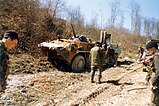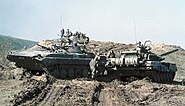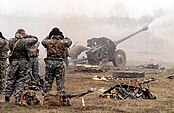
Back الحرب الشيشانية الثانية Arabic Segunda guerra chechena AST İkinci Çeçenistan müharibəsi Azerbaijani Другая чачэнская вайна Byelorussian Другая расейска-чачэнская вайна BE-X-OLD Втора чеченска война Bulgarian Perang Chechnya II BJN Segona guerra de Txetxènia Catalan جەنگی دووەمی چیچان CKB Druhá čečenská válka Czech
| Second Chechen War | |||||||||
|---|---|---|---|---|---|---|---|---|---|
| Part of the Chechen–Russian conflict and Post-Soviet conflicts | |||||||||
Top right: Russian troops en route to Grozny on 18 November 1999 Bottom left: Russian troops firing their artillery from Achkhoy-Martan on 2 December 1999 Bottom right: Russian President Dmitry Medvedev meets FSB director Alexander Bortnikov in March 2009 to discuss the end of counter terrorism operations inside Chechnya | |||||||||
| |||||||||
| Belligerents | |||||||||
|
Foreign volunteers: | ||||||||
| Commanders and leaders | |||||||||
|
killed generals: Pro-Russian Chechens: |
Arab Mujahideen: | ||||||||
| Strength | |||||||||
|
Russian claim: 80,000 (in 1999)[10] |
9,000 (in 1999)[11] 7,000 (in 2000)[11] Russian claim: ~22,000[12] | ||||||||
| Casualties and losses | |||||||||
|
Russian estimate: 9,000–11,000 killed (1999-Feb. 2002; Janes)[17] 4,749 killed (Aug. 2002-Aug. 2003; IISS)[18] 14,000 killed (1999-March 2005; Committee of Soldiers' Mothers)[19] |
Chechen claim:[d] 16,299 killed (1999–2009)[21][22] | ||||||||
|
Civilian casualties Estimate total number of casualties: 30,000 civilians dead (25,000 killed and 5,000 disappeared) according to AI[23] ~80,000 killed in Chechnya (GfbV estimate)[24] More in neighbouring regions 40,000–45,000 civilians killed (Kramer)[25] More than 600 killed during attacks in Russia proper. Total killed military/civilian: ~50,000–80,000 | |||||||||
The Second Chechen War (Russian: Втора́я чече́нская война́,[e] Chechen: ШолгIа оьрсийн-нохчийн тӀом, lit. 'Second Russian-Chechen War'[27]) took place in Chechnya and the border regions of the North Caucasus between the Russian Federation and the breakaway Chechen Republic of Ichkeria, from August 1999 to April 2009.
In August 1999, rogue Islamists from Chechnya infiltrated Dagestan in Russia. Later in September apartment bombings occurred in Russian cities, killing over 300 people. Russian authorities were quick to blame Chechens for the bombings, although no Chechen, field commander or otherwise, took responsibility for the attacks. During the initial campaign, Russian military and pro-Russian Chechen paramilitary forces faced Chechen separatists in open combat and seized the Chechen capital Grozny after a winter siege that lasted from December 1999 until February 2000. Russia established direct rule over Chechnya in May 2000 although Chechen militant resistance throughout the North Caucasus region continued to inflict many Russian casualties and challenge Russian political control over Chechnya for several years. Both sides carried out attacks against civilians. These attacks drew international condemnation.
In mid-2000, the Russian government transferred certain military responsibilities to pro-Russian Chechen forces. The military phase of operations was terminated in April 2002, and the coordination of the field operations was given first to the Federal Security Service and then to the Ministry of Internal Affairs in the summer of 2003.
By 2009, Russia had disabled the Chechen separatist movement and mass fighting ceased. Russian army and Interior Ministry troops ceased patrolling. Grozny underwent reconstruction and much of the city and surrounding areas were rebuilt quickly. Sporadic violence continued in the North Caucasus; occasional bombings and ambushes against federal troops and forces of the regional governments in the area still occur.[28][29]
In April 2009, the government operation in Chechnya officially ended.[9] As the bulk of the army was withdrawn, responsibility for dealing with the low-level insurgency was shouldered by the local police force. Three months later, the exiled leader of the separatist government, Akhmed Zakayev, called for a halt to armed resistance against the Chechen police force from August. This marked the end of the Second Chechen War. The death toll of the conflict is unknown, although the total loss of human life, including combatants and non-combatants, is estimated to be over 60,000.
- ^ "Turkish Volunteers in Chechnya". The Jamestown Foundation. Archived from the original on 3 March 2016. Retrieved 20 May 2015.
- ^ The Chechens: A Handbook, p. 237, at Google Books
- ^ Politics of Conflict: A Survey, p. 68, at Google Books
- ^ Energy and Security in the Caucasus, p. 66, at Google Books
- ^ Cooley, John K. (2002). Unholy Wars: Afghanistan, America and International Terrorism (3rd ed.). London: Pluto Press. p. 195. ISBN 978-0-7453-1917-9.
A Turkish Fascist youth group, the "Grey Wolves," was recruited to fight with the Chechens.
- ^ Goltz, Thomas (2003). Chechnya Diary: A War Correspondent's Story of Surviving the War in Chechnya. New York: Thomas Dunne Books. p. 22. ISBN 978-0-312-26874-9.
I called a well-informed diplomat pal and arranged to meet him at a bar favored by the pan-Turkic crowd known as the Gray Wolves, who were said to be actively supporting the Chechens with men and arms.
...the Azerbaijani Gray Wolf leader, Iskander, Hamidov... - ^ Isingor, Ali (6 September 2000). "Istanbul: Gateway to a holy war". CNN. Archived from the original on 17 October 2014.
- ^ Galeotti, Mark (10 November 2022). Putin's Wars: From Chechnya to Ukraine. Bloomsbury Publishing. p. 20. ISBN 978-1-4728-4753-9.
- ^ a b "Russia 'ends Chechnya operation'". BBC News. 16 April 2009. Archived from the original on 12 August 2017. Retrieved 14 April 2009.
- ^ Кривошеев, Г. Ф., ed. (2001). Россия и СССР в войнах XX века. Потери вооруженных сил (in Russian). Олма-Пресс. p. 593. ISBN 5-224-01515-4.
- ^ a b "Breaking the Conflict Trap: Civil War and Development Policy" (PDF). World Bank Policy. Archived (PDF) from the original on 23 April 2022. Retrieved 17 June 2022.
- ^ Федеральным силам в Чечне противостоят 22 тыс. боевиков Russian Ministry of Defense Archived 27 September 2007 at the Wayback Machine
- ^ Military: 3,688 killed in Chechnya (1999–2007),[1] Archived 4 January 2016 at the Wayback Machine 28 killed in Chechnya (2008),[2] 10 killed in Dagestan (2005),[3] Archived 12 March 2024 at the Wayback Machine total of 3,726 reported killed.
- ^ Interior ministry troops: 1,614–1,822 killed in Chechnya (1999–2002),[4][permanent dead link][5] 279 killed in Chechnya (2004–2005),[6] Archived 1 December 2021 at the Wayback Machine 200 killed in Dagestan (2002–2006), 45 killed in Chechnya and Dagestan (2007),[7] 226 killed in the North Caucasus (2008),[8] total of 2,364–2,572 reported killed.
- ^ "Defense and Security / PressPATROL / Media Monitoring Agency WPS". old.wps.ru. Archived from the original on 4 January 2016. Retrieved 2 January 2023.
- ^ "The History Guy: The Second Chechen War". www.historyguy.com. Archived from the original on 3 May 2019. Retrieved 23 January 2023.
- ^ "Russian Authorities Said To Be Underreporting Combat Deaths". Jamestown. Archived from the original on 21 March 2017. Retrieved 13 December 2022.
- ^ "CHECHNYA: Independence, Islam and Bloodshed". Deutsche welle. Archived from the original on 21 March 2017. Retrieved 13 December 2022.
- ^ "Russia acknowledges 500 soldiers killed in Chechnya since 2006". Spacewar.com. 30 March 2016. Archived from the original on 13 February 2021. Retrieved 17 October 2011.
- ^ Babitskiy, Andrey. "Shamil Basayev's interview with Andrei Babitsky aired by the American channel ABC on July 28, 2005". Archived from the original on 20 December 2022. Retrieved 20 December 2022.
- ^ "Security Watch: December 24, 2002". Radio Free Europe/Radio Liberty. Archived from the original on 15 August 2018. Retrieved 24 December 2002.
- ^ "Более 2 тысяч боевиков уничтожено на Юге России с 2003 года". 7 October 2009. Archived from the original on 19 March 2023. Retrieved 19 March 2023.
- ^ Amnesty International Issues Reports on Disappearances Archived 10 October 2008 at the Wayback Machine Jamestown Foundation, 24 May 2007
- ^ Sarah Reinke: Schleichender Völkermord in Tschetschenien. Verschwindenlassen – ethnische Verfolgung in Russland – Scheitern der internationalen Politik. Gesellschaft für bedrohte Völker, 2005, page 8 (PDF Archived 12 August 2014 at the Wayback Machine)
- ^ Mark Kramer: "Guerrilla Warfare, Counterinsurgency and Terrorism in the North Caucasus: The Military Dimension of the Russian-Chechen Conflict", Europe-Asia Studies, Vol. 57, No. 2 (March 2005), p.210 (JSTOR 30043870)
- ^ Federal law of 12 January 1995 N 5-FЗ «On veterans», appendix, part III
- ^ ""Путине болчул а алсам цабезам бу сан Кадыровга"". Маршо Радио (in Chechen). 17 October 2019. Archived from the original on 21 October 2020. Retrieved 24 May 2021.
- ^ "CIA – The World Factbook – Russia". Cia.gov. Archived from the original on 9 January 2021. Retrieved 17 October 2011.
- ^ It's over, and Putin won Archived 21 January 2013 at the Wayback Machine The Guardian Retrieved on 23 February 2009
Cite error: There are <ref group=lower-alpha> tags or {{efn}} templates on this page, but the references will not show without a {{reflist|group=lower-alpha}} template or {{notelist}} template (see the help page).
© MMXXIII Rich X Search. We shall prevail. All rights reserved. Rich X Search



